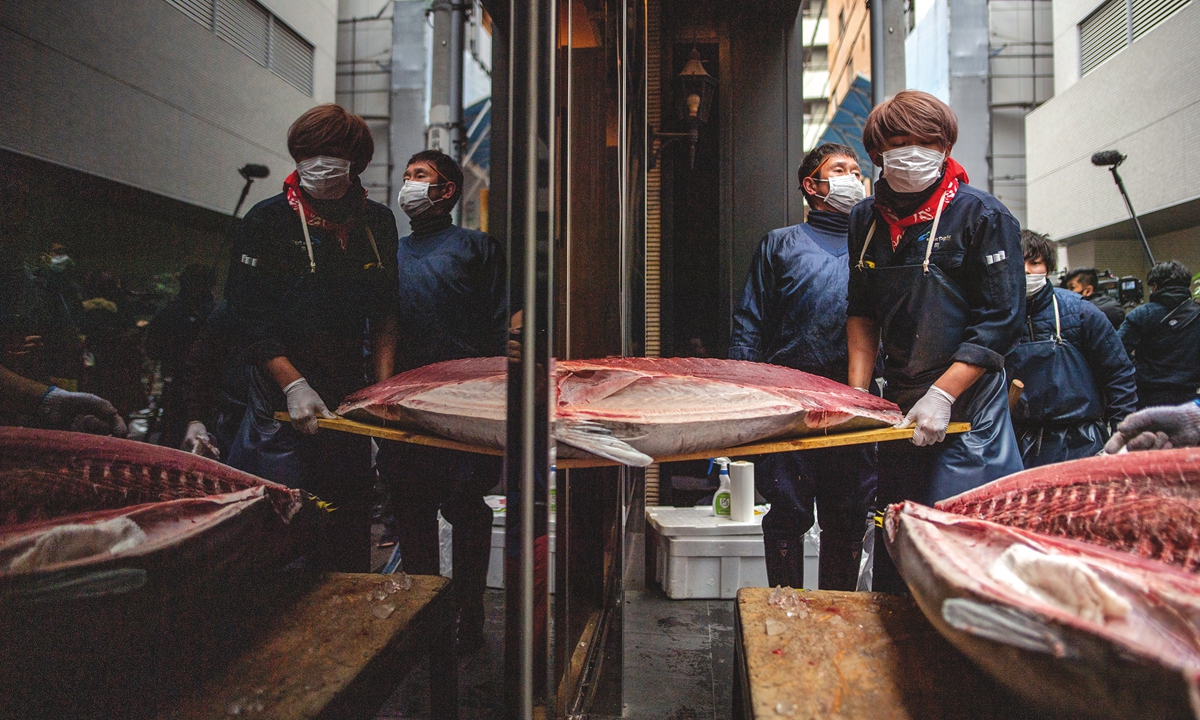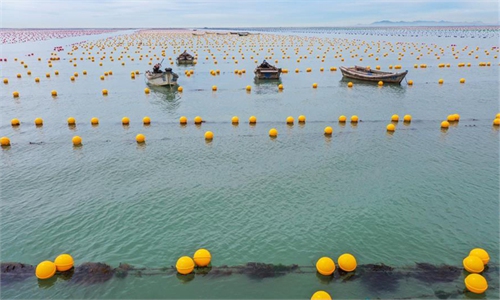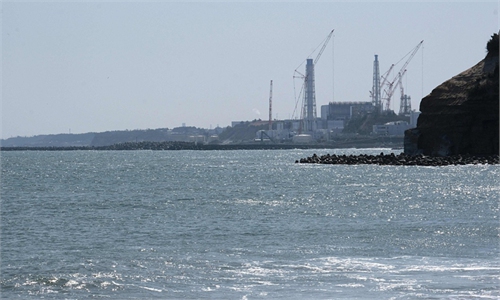Chinese fishing industry warns of profound, global impact from Japan’s nuclear plan
Fishing sector warns of global, profound impact

Wholesaler Yukitaka Yamaguchi (back) watches as staff members carry one of the auctioned tuna at a restaurant in Ginza, after the New Year's auction at Toyosu fish market in Tokyo, Japan. Tuna sold at new year auction goes for just 10 percent of 2020 price, according to the Japan Times. Photo: AFP
Japan's arbitrary decision to dump nuclear wastewater into the ocean has sparked fierce opposition and deep concerns among the Chinese fishing industry, which warns of a potentially unprecedented food safety crisis that would have profound impact on not just China but also countries around the Pacific Ocean and beyond, including the US and Canada.
Japan announced on Tuesday that it would release radioactive water from the crippled Fukushima nuclear facility into the sea, despite strong international opposition, especially from neighboring countries.
Japan's decision drew intense criticism from Chinese officials, consumers as well as relevant businesses. China's fishing industry representatives and traders said that the move could affect imported seafood and force them to seek other sources as consumers may stay clear of potentially impacted seafood.
"We are concerned that if some product runs into problem, the impact on that product or the whole fishing industry could be very profound. At worst, it could affect people's diets and consumption," Weng Qiang, a purchasing manager of Sunkfa Holding Group, a leading Beijing-based seafood company, told the Global Times on Tuesday.
The company imports seafood mostly from the West, including crabs from the US' West Coast, salmon from Australia, and some deep-sea silver cod. Despite the risks, some Western countries have been largely silent on the issue, while the US openly supported the move.
An shrimp importer surnamed Liu in Qingdao, East China's Shandong Province, told the Global Times on Tuesday that there's a lot of concern about the wastewater dumping and its potential impact on shrimp supplies.
"We have been importing shrimps from Canada for many years, but if the shrimps are found to be contaminated after the dumping, we would have to look at other options," said Liu. Russia and Greenland could be ideal alternatives.
Following the nuclear disaster in Fukushima, Chinese authorities have banned distributors from importing food and agricultural products from several Japanese prefectures.
Those bans are still in place, several customs ports confirmed to the Global Times on Tuesday.
While it's still two years until Japan's planned dumping, industry insiders said that they worry about a long, deep impact on the fishing sector throughout the Pacific and beyond.
Prevailing currents in the Pacific Ocean mean that South Korea, China, Vietnam, the US, Canada and other countries could all be impacted by the contamination, Gui Liming, professor at the Department of Engineering Physics of Tsinghua University and an expert on nuclear safety system, told the Global Times on Tuesday.
"The impact will be hidden in the short run, but it will be reflected in the long term," Gui said. "When radioactive substances in the Pacific Ocean spread to the sea areas in multiple countries, the radiation exposure levels in people's bodies may increase after eating contaminated marine products. That may later affect the structure of human DNA."
Radioactive elements such as tritium, carbon-14 and strontium-90 will be long-lived in the ocean and circulated by oceanic currents, posing danger to fishing within or outside China in the long run, the expert warned.
Such a potentially serious adverse impact on marine life has already led some to conduct more research and mull contingency plans.
An employee of the China Fisheries Association (CFA) told the Global Times on condition of anonymity on Tuesday that the group was in touch with corresponding research institutes over the potential impact on the fishery industry.
"Our fishery business in Shandong involves not just the surrounding seas, but also the Pacific Ocean where our fish-catching rate is very high compared with other regions, accounting for more than 50 percent of the total," He Farui, a director of the Shandong representative office of the CFA, told the Global Times.
In addition to the impact on businesses, there is also a potential health risk for people in the fishing sector, industry insiders said.
"There are up to 130,000 fishermen in Shandong and perhaps 1 million nationwide. If the nuclear wastewater is dumped into the sea, the impact will go beyond food safety to the health of these people," said He.
Given the potential impact, some people in China have already been calling for preparation to seek compensation from Japan for damages.


